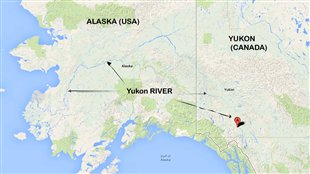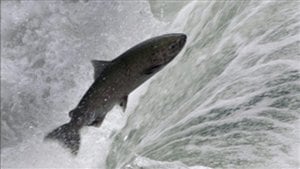They are called “King” salmon, the wild Chinook salmon in Alaska and the Yukon are among the most desirable catch of all salmon. They live in the Pacific Ocean but return to spawn in the fresh water rivers and streams where they were born.
To get to the Yukon they must swim up the Yukon River about 3,000 km to Whitehorse.

They have always been vital to aboriginal groups in both countries and have sustained a viable commercial fishery and international treaty states that they US must allow at least 42,500 to reach the Canadian border below Dawson City.
For years however the salmon numbers have been dwindling, and this year’s salmon run on the Yukon may be the worst ever.
Aboriginals and environmentalists in Yukon territory in Canada are calling on Americans to stop fishing Chinook Salmon. They say the managing of fish to ensure fair return to Canada has failed miserably.
The International Yukon River Panel with 6 members from each country, is meeting in Whitehorse, Yukon this week to discuss the issue

The chief of the Teslin Tlingit First Nation, Carl Sidney, is a former panel member. He’s calling on Canadian authorities to get tough with the Americans.
The science presented to the panel indicated of the approximately 114,000 chinook which entered the river this year, approximately 61,000 were of Canadian origin – 30,750 made it to the border below Dawson City.
US officials say they have enforced fishing cutbacks, but while Carl Sidney commends the Americans for cutbacks on salmon capture in some communities,he says a complete shutdown is required for the fishery to recover.
There was no commercial fisheries in Alaska and the Yukon last year, but the numbers are still declining.
“There have been families and communities taking drastic measures but not everybody,” Sidney says. “When 106,000 salmon come into the mouth of the Yukon River and only 30,000 fish come across the Yukon border, where are the other 60,000-70,000? I know there are other tributaries where they go but where are the others?”
The International Yukon Panel wraps up its discussions today.







For reasons beyond our control, and for an undetermined period of time, our comment section is now closed. However, our social networks remain open to your contributions.